- Home
- Mark Hodder
Macallister Fogg 2: Great Great Great (And So Forth) Uncle Dragoslav
Macallister Fogg 2: Great Great Great (And So Forth) Uncle Dragoslav Read online
THE ADVENTURES OF THE SOMEWHAT SINGULAR MR MACALLISTER FOG
2
GREAT GREAT (AND SO-FORTH) UNCLE DRAGOSLAV
MARK HODDER
Text copyright © 2013 Mark Hodder
All Rights Reserved
To Dave Brock
I
“Well, Mrs Boswell, you’ve done it again. By golly! What an absolute travesty!”
Macallister Fogg’s deep and slightly raspy voice had come from behind the latest issue of The Baker Street Detective.
Mrs Emma Boswell, widow of the late Captain “Bingo” Boswell, looked up from her desk and scowled at her employer, who was sprawled in his favourite cracked and scuffed leather armchair in front of the fireplace. She was a slim, long-limbed, and dark-haired woman whose features were balanced precariously between plain and pretty, appearing to be the former from most angles, and the latter from too few others.
“Are you referring to The Case of the Dynamic Dinosaur?” she asked, noting the badly drawn Tyrannosaurus Rex that adorned the cover of the penny blood.
“I am,” Fogg replied. “And you know full well that it was a plesiosaur, not a tyrannosaur, and it most certainly did not come to life and terrorise the British Museum!”
Emma shook her head despairingly. “For the umpteenth time, Mr Fogg, our cases would be of little interest to the public if I neglected to add to them thrills and spills, hair’s breadth escapes, devious foreigners, and fantastical menaces. That’s what sells. That’s what earns us a pittance enough for me to pay the household bills and for you to fritter away on your ridiculous contraptions.”
Fogg lowered the paper. His eyes twinkled bright blue. He was a short, blunt-featured and thickset man, with a wide brown moustache that curled upwards at its ends, a square and stubborn-looking chin, and short bristly hair.
“But a rampaging fossil? Absurd!”
“Quite so, sir, but it is an absurdity that will see us through a full month. Had we relied solely on the money from the case itself, we’d be eating nothing but baked potatoes.”
Fogg grunted and disappeared behind the paper again.
His secretary narrowed her green eyes. The muscles to either side of her jawbone flexed spasmodically. Her hands curled into fists. She groaned.
“Don’t tell me!”
“Hum?” Fogg responded in a distracted tone.
“You’ve already spent it, haven’t you?”
“What’s that, my dear?”
Emma stood and paced over to the fireplace. With hands on hips, she glared down at Fogg.
“What was it this time? A thousand and one miniature gearwheels? Ten miles of copper piping? A five-ton crankshaft? A steam-powered flying machine?”
With a careless disregard for orderliness, Fogg tossed the story paper onto the floor. He reached down and pulled one of a great many small levers that projected from the left side of his armchair. On the other side of the fireplace, a jointed metal rod with pincers at its end whirred out from the wall, dipped down, reached into a container on the hearth, and pulled out a cigar.
“Steam-powered flying machine, hmm? Interesting!”
Emma Boswell stamped her foot. “Tell me, sir! What have you squandered our finances on?”
A second rod hinged outward and scissors at its end snipped the tips off the cigar.
Fogg grinned. “Equipment necessary for the construction of clockwork bellows, madam!”
The scissors slid back into their housing. A third rod appeared, angled into the fire, then withdrew and applied the burning wick at its end to the cigar. The first rod slid up and over the hearth and delivered the Flor de Dindigul into Fogg’s waiting hand.
“Clockwork bellows?” Emma gave the cigar delivery system a ferocious glance as the little metal arms folded away. “Clockwork bellows? What on earth are they?” She gritted her teeth as Fogg unhurriedly drew on his cigar before answering.
“A device designed to expel air at considerable speed without the need for manual pumping.”
“To what end?”
“By the Lord Harry, Mrs Boswell! I don’t know! That will be for commercial interests to decide! But you can be sure of one thing—”
“And what, may I ask, is that?”
Fogg rubbed the pads of his left thumb and forefinger together. “There’s money in it!”
Throwing out her arms in exasperation, Emma strode into the centre of the room and waved her hands at the shelves that lined two of the walls—all heaped with books and documents and tools and small items of machinery—and at the bare wood floor, which had newspapers and cigar butts scattered all over it, and at Macallister Fogg’s two workbenches, which, unlike her neat and tidy desk, were heaped high with a perfectly chaotic jumble of items.
“Money in it?” she cried out. “We can’t even afford a maid! Look at this place! It’s a confounded rubbish dump! You are irresponsible, sir! You are a spendthrift! You are lazy and impractical and—and—and probably a lunatic!”
Fogg examined his cigar and muttered, “I don’t know why I started smoking this blessed thing. It’s a drink I want.” He flicked the tube of tobacco into the fire.
Emma Boswell clapped her hands to her head and dug her fingers into her hair. A thick strand of it fell loose and dropped across her face. “You threw it away!” she shouted. “A Flor de Dindigul! Wasted! You took one puff of it and threw it away! You—you—you—impossible man!”
Fogg frowned, stood up, and hooked his hands behind his back. He looked apologetically at his secretary, who, at five foot nine was four inches taller than him, and said, “Would you make a pot of tea, please, Mrs B?”
“No, I won’t!” she yelled. “There is none! We can’t afford it!”
He sighed and cast his eyes over The Baker Street Detective, which lay at his feet.
“Perhaps I’d have more success as one of your fiendish criminals than I’m having as a consulting detective,” he said, sheepishly. “How long ago was it, that dinosaur business?”
Emma pushed her hair back into place and replied, in a calmer but cold and clipped voice, “Nine weeks.”
“And how many cases have I had since then?”
“Five. The Adventure of the Absconding Aeronaut, The Secret of the Santa Claus Society, The Strange Affair of the String Filled Sack, The Mystery of the Missing Mermaid, and The Riddle of the Revolving Rats. I don’t include that Egyptian mummy business because you weren’t paid for it.”
“If I remember rightly,” he said, “which I do, on account of the fact that there’s nothing much else that needs remembering, the first involved a runaway husband?”
“Correct. And the next a minor financial swindle; the third, the concealing of fairly insignificant evidence; the fourth, the theft of a garden ornament; and the fifth, the spilling of an ever-so-slightly-hazardous chemical substance. Nothing at all dramatic.”
“Until you, my dear, recorded them—with wild additions and unrestrained exaggerations—for this rag.” He poked the story paper with the toe of his slipper.
“Exactly, sir. And, as I say, Consolidated Press pays a great deal more for the stories than your clients do for the cases that inspire them.”
“Hmm. Perhaps, then, what I need is a better standard of client.”
Emma closed her eyes and let a breath hiss through her teeth. “What you need,” she said slowly, “is more attention given to your job and less devoted to the construction of entirely pointless mechanisms like that—” She jerked her head disdainfully towards the cigar dispenser. “This street, Mr Fogg—Baker Street—is packed full of
detectives, just as Savile Row is filled with tailors and Harley Street with doctors and Hatton Gardens with diamond dealers. Your competitors have worked on building their reputations and are prosperous as a result. They can afford to live comfortably and pick and choose their clients as they see fit. If you only applied yourself as they do, we would have tea in the caddy, food in the cupboard, and I wouldn’t have to write nonsense for the penny dreadfuls!”
The doorbell jangled.
Fogg reached down to his chair, pulled one of its levers, then turned to the great many framed daguerreotypes and pictures that were hanging above the mantelpiece. Among them them, there hung a small glass fronted display case containing a golden amulet that possessed a faint radiance about it. The entire case slid sideways to reveal a mirror beneath. Through the ingenious placement of lenses and other mirrors in the cavities of the walls, it reflected the person who was currently standing on the front doorstep. The image was, unfortunately, upside down and out of focus—a problem Fogg thought he might know how to fix but hadn’t yet attended to.
“A rather elegantly dressed woman,” Emma Boswell observed. She’d moved to the bay window and was looking through the net curtain at the side of it, thus gaining an unrestricted and right-way-up view of the visitor.
Fogg bent sideways and angled his head down, peering at the reflection. “Elegant? Are you sure? She looks like a flower seller to me.”
“If you’d only observe her through the window instead of squinting at that entirely superfluous contrivance, you’d see that she’s very obviously well-to-do and probably a prospective client. I shall show her into the Consulting Room. Be on your best behaviour, if you please.”
Macallister Fogg watched his secretary exit the room then sat down and kicked off his slippers. One of them went spinning into the fireplace and started to smoulder. He yanked it out and slapped it on the floor until he was satisfied that it wasn’t going to burst into flames. Reaching under his chair, he then retrieved a pair of rather worn leather boots, which he put on and laced up. He stood and brushed down his trousers, straightened his jacket, and adjusted his tie. Dipping his fingers into his pocket, he fished out a briar pipe, looked at it, pursed his lips, and put it back.
“Don’t feel like smoking that, either,” he murmured.
The door opened and Emma stepped back in. She closed the portal behind her and said, “Lady Hufferton wishes to avail herself of your services.”
Fogg’s eyebrows shot up. “The Lady Hufferton?” he asked. “Of Hufferton Hall? The one married to Lord Hufferton? I mean to say, the lady not the hall. Married, that is. To Lord Hufferton.”
“Yes. That one.”
“Hufferton Hall, which houses the famous Museum of Mechanical Marvels? The Hufferton Hall near Edinburgh?”
“Yes, yes, and will you please stop saying Hufferton! She’s waiting, Mr Fogg. Shall I attend?”
“Of course. Propriety and whatnot. Hufferton! By golly! Hufferton! Perhaps you should offer her a cup of tea. If she accepts, I’d like one too, please.”
“There is no tea.”
“But she’s Lady Hufferton!”
“I’m well aware of that, thank you. And she’s still waiting.”
“Ah. Quite so. Well, well, this is a turn up, isn’t it?”
They stepped out of the lounge—or study, or library, or workshop; Fogg hadn’t yet decided what to call it—and crossed the hallway to the Consulting Room, which Emma Boswell managed to keep spotlessly clean and tidy, thanks to the fact that her employer spent so little time in it.
Lady Hufferton was sitting in a chair in front of a large desk. She was extravagantly attired in black crinoline skirts and a crimson velvet jacket, and wore a small pillbox hat from which a short black veil hung, obscuring the top half of her face. There were pearls around her neck. Her skin was alabaster white. Her hands were concealed inside a mink fur muff.
She looked up as Macallister Fogg entered.
“Good morning, madam,” he said, giving an ill-thought-out and thus awkward and half-hearted bow. “I do hope the fog didn’t inconvenience you. It always seems thickest in this part of the city. I expect it will clear by lunchtime.”
“Good afternoon,” she replied, in a mellifluous and slightly accented voice.
“Is it?” Fogg drew his pocket watch from his waistcoat. “Heavens above! Three o’clock!”
Lady Hufferton smiled. “I expect time slips away from you when you’re busy solving mysteries.”
“What? Am I? Oh yes! Indeed! Indeed!”
He moved around the desk, sat behind it, and leaned his elbows on it. With a thunk, it listed to one side.
“Oops!” he said. “Forgot. Uneven floor. Or perhaps a short leg. I refer to the desk’s, not mine.”
He lifted his arms and the desk fell back into place.
“Look at that,” he said, gripping the edge of it and wobbling it back and forth.
Thunk. Thunk. Thunk.
He gave a despairing shake of his head. “Shoddy workmanship, I should say.”
Emma Boswell, standing by the door, cleared her throat noisily.
Lady Hufferton turned to her.
“Forgive my impertinence, my dear, but might I request a cup of tea? The aforementioned pea souper seems to have lined the back of my throat.”
“Why, certainly! Pray forgive me, Lady Hufferton; I should have offered it!”
Pointedly refusing to meet Fogg’s eyes, Emma left the room.
The detective stifled a sigh and opened a thick notebook. He turned to the first blank page—which was, in point of fact, only the third page in—took the lid from a pot of ink, unscrewed a pen, dunked its nib into the liquid, and looked up at his visitor.
“How may I help you?” he asked. “Detective-wise.”
“By assassinating someone,” she replied.
The desk went thunk. A big drop of ink oozed from the pen and plopped onto the paper. Fogg distractedly brushed it away, realising, as he did it, that it was the wrong thing to do. The ink smudged across the page and stained the edge of his hand and shirt cuff.
“Blast it!” he muttered, then, “Assassinate? I don’t think—”
Lady Hufferton held up a hand to stop him talking. He noticed that she had unusually long fingers.
“Allow me to explain,” she said. “I am known as Lady Constance Elizabeth Hufferton, but I was born Constanta Elisabeta Lacusta, and I belong to a family that considers itself to be the true monarchy of a small princedom in the Balkans. The throne of that land has long been occupied by members of a rival family; one that, in my opinion, has a far greater right to it.”
Fogg scribbled in his notebook: Lacusta. Balkan princedom. Tea. Rival families.
“So you stand in opposition to your own family’s claim?” he asked.
“I do, and, under the pretext of a European tour, I fled from my kinfolk seven years ago.”
“In 1851?”
“1850.”
Fogg frowned, thought hard, and said, “Oh yes. My mistake. I hate mathematics. Use it all the time in my experiments. Advanced stuff. Sometimes the basics escape me. Do you think the human brain operates consecutively on a number of different levels, Lady Hufferton?”
“I think I’d like to continue my account, sir.”
“Of course. My apologies. Please do. Kinsfolk. Fled. 1850.”
“Yes. I took refuge here, in your country, where I met and married Sir Philip Hufferton. I am now pregnant with our first child.”
Fogg coughed, he dropped his pen, picked it up, and, after a slight hesitation, wrote: Inconvenienced.
He peered at his visitor. It was impossible to see her eyes clearly through the veil. Her lips were a very dark shade of red. The hand she’d taken from the muff was now resting on top of the fur, and its fingernails were painted black. They were long and slightly pointed, almost claw-like.
“Tell me more,” he said. “I mean about your—that is to say, not about the preg—um—er—So have you had any
contact with your family since your marriage?”
Thunk.
“No, and there are not many of them left now. The Lacustas suffer from an extremely rare and incurable disease of the blood. Of those who could conceivably make a legal bid for the throne, only two remain: myself, and my Great Great Uncle Dragoslav Marinko Lacusta. When my son is born—”
“How do you know your child will be a boy?”
“We may have dwindled almost to nothing, but the Lacustas have a very long and well-documented history, Mr Fogg, and invariably our first-borns are male. I will have a son, and because of the disease I carry, I will almost certainly haemorrhage during his birth and bleed to death.”
“Crikey!” Fogg exclaimed. “That’s bad luck!” He winced, and scribbled: Inappropriate. You ass.
“Yes, I suppose it is. Which brings us to my reason for being here. Two weeks ago, my husband and I travelled down from Edinburgh for the capital’s social season. This Friday night past, we went to the Adelphi Theatre where I saw, sitting in one of the boxes opposite our own, my great great uncle. Fortunately, he did not see me.”
“You don’t want him to find you?”
“I live in terror that he might. Especially now.”
“Why so?”
“Because if he discovers that I’m pregnant, he will wait, then he will take my son.”
The door opened and Emma Boswell entered bearing a tea tray.
“For what purpose?” Fogg asked.
“To raise him as a vampire.”
The desk wobbled. Fogg chuckled. He wrote crackpot and said, “But really?”
“I’m not joking, sir.”
Emma put the tray onto a small side table by the wall. There was only one cup and saucer on it.
Fogg scowled.
“Milk and sugar, Lady Hufferton?” his secretary asked.
“Yes please. Two lumps.”
Emma obliged and handed the cup to the visitor. “There you are. Vampire?”
“Why, yes, young lady. All the Lacustas are vampires.”
“Ah.” Emma crossed to a chair next to the side table and sat down.

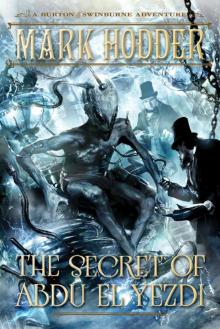 The Secret of Abdu El Yezdi
The Secret of Abdu El Yezdi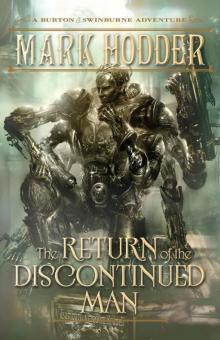 The Return of the Discontinued Man
The Return of the Discontinued Man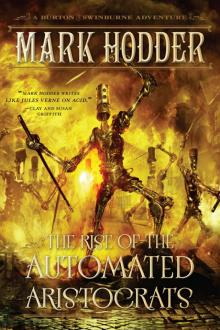 The Rise of the Automated Aristocrats
The Rise of the Automated Aristocrats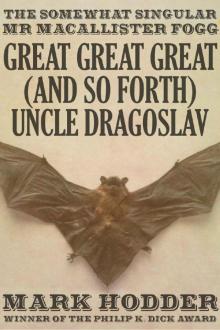 Macallister Fogg 2: Great Great Great (And So Forth) Uncle Dragoslav
Macallister Fogg 2: Great Great Great (And So Forth) Uncle Dragoslav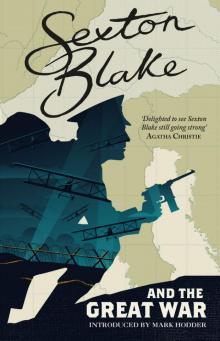 Sexton Blake and the Great War
Sexton Blake and the Great War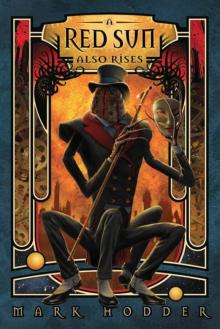 A Red Sun Also Rises
A Red Sun Also Rises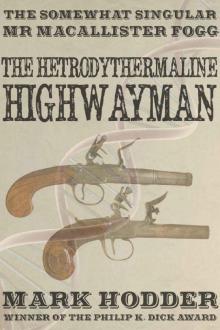 Macallister Fogg 3: The Hetrodythermaline Highwayman
Macallister Fogg 3: The Hetrodythermaline Highwayman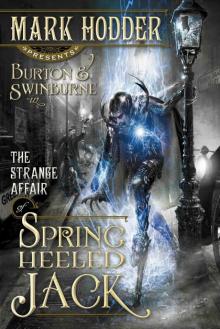 The Strange Affair of Spring Heeled Jack
The Strange Affair of Spring Heeled Jack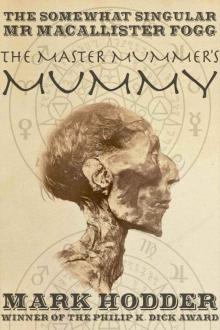 Macallister Fogg 1: The Master Mummer's Mummy (The Adventures of Macallister Fogg)
Macallister Fogg 1: The Master Mummer's Mummy (The Adventures of Macallister Fogg)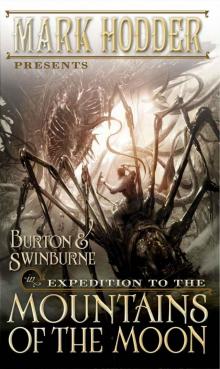 Expedition to the Mountains of the Moon bas-3
Expedition to the Mountains of the Moon bas-3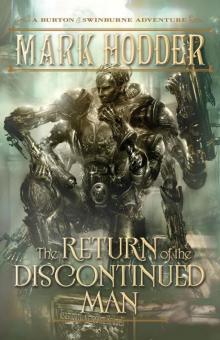 The Return of the Discontinued Man (A Burton & Swinburne Adventure)
The Return of the Discontinued Man (A Burton & Swinburne Adventure)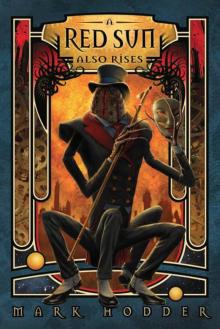 Red Sun Also Rises, A
Red Sun Also Rises, A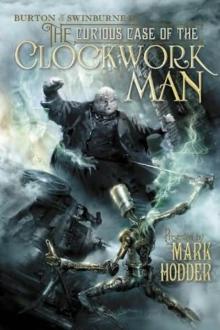 The curious case of the Clockwork Man bas-2
The curious case of the Clockwork Man bas-2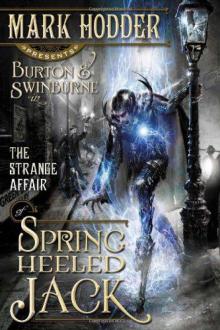 The strange affair of Spring-heeled Jack bas-1
The strange affair of Spring-heeled Jack bas-1